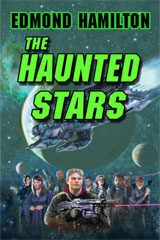
It meant little to young Robert Fairlie, a serious and dedicated philologist, that in this year 1966 the United States and Soviet Russia were contentious about the Moon. He had little interest in the first two rocket landings on the moon, and the bases that the two nations had built there. He knew nothing at all of the shattering discovery that the Americans had made there.
For what had been found was of such explosive potentialities that it had to be kept top-secret—the discovery that space had already been conquered long ago by races who had once spanned the stars. So that men who had expected to spend decades in reaching the nearest planet, found suddenly in their hands the way to the wider universe.
Fairlie, drawn unexpectedly because of his special knowledge into this greatest of secrets, finds that a guarded New Mexico rocket-base is only the first step of the way. That way leads out amid the unexplored stars to the lost heartworld of those space-conquerors of long ago. And it leads Fairlie and others into the appalling reality of stellar space still haunted by the past cosmic struggle whose scale in space and time dwarfs the rivalries of tiny Earth's quarreling nations.
The Haunted Stars
SKU: 1515006980
$4.00


Select the format you would like to download:
Download Unzipped Files
EPUB/Kindle/Apple iOS/Nook Format
Download Zip Files
EPUB/Kindle/Apple iOS/Nook Format Zip

It meant little to young Robert Fairlie, a serious and dedicated philologist, that in this year 1966 the United States and Soviet Russia were contentious about the Moon. He had little interest in the first two rocket landings on the moon, and the bases that the two nations had built there. He knew nothing at all of the shattering discovery that the Americans had made there.
For what had been found was of such explosive potentialities that it had to be kept top-secret—the discovery that space had already been conquered long ago by races who had once spanned the stars. So that men who had expected to spend decades in reaching the nearest planet, found suddenly in their hands the way to the wider universe.
Fairlie, drawn unexpectedly because of his special knowledge into this greatest of secrets, finds that a guarded New Mexico rocket-base is only the first step of the way. That way leads out amid the unexplored stars to the lost heartworld of those space-conquerors of long ago. And it leads Fairlie and others into the appalling reality of stellar space still haunted by the past cosmic struggle whose scale in space and time dwarfs the rivalries of tiny Earth's quarreling nations.
Published: 9/1/2008
It meant little to young Robert Fairlie, a serious and dedicated philologist, that in this year 1966 the United States and Soviet Russia were contentious about the Moon. He had little interest in the first two rocket landings on the moon, and the bases that the two nations had built there. He knew nothing at all of the shattering discovery that the Americans had made there.
For what had been found was of such explosive potentialities that it had to be kept top-secret—the discovery that space had already been conquered long ago by races who had once spanned the stars. So that men who had expected to spend decades in reaching the nearest planet, found suddenly in their hands the way to the wider universe.
Fairlie, drawn unexpectedly because of his special knowledge into this greatest of secrets, finds that a guarded New Mexico rocket-base is only the first step of the way. That way leads out amid the unexplored stars to the lost heartworld of those space-conquerors of long ago. And it leads Fairlie and others into the appalling reality of stellar space still haunted by the past cosmic struggle whose scale in space and time dwarfs the rivalries of tiny Earth's quarreling nations.
Published: 9/1/2008
More books by Edmond Hamilton (15)
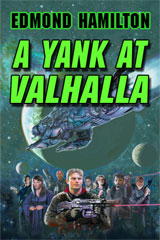
A Yank at Valhalla
We stood petrified by horror in that foggy, stonewalled corridor, gazing cataleptically at the hideous creature whose reptilian head was rearing up from the curling white mists. Freya's slim figure had shrunk against me with a choking cry. Frey stood in front of us, his sword raised, his face wild as he looked up at the looming head. The hideous, abnormally huge coils could only be glimpsed in the mists beyond. But the giant spade-shaped head that hung above us was clear to our appalled vision. The enormous, opaline eyes were brilliant as they stared down at us. "The Midgard snake!" Frey whispered. "Jarl Keith!" Freya screamed to me. The great head of the snake Iormungandr abruptly darted toward us.

We stood petrified by horror in that foggy, stonewalled corridor, gazing cataleptically at the hideous creature whose reptilian head was rearing up from the curling white mists. Freya's slim figure had shrunk against me with a choking cry. Frey stood in front of us, his sword raised, his face wild as he looked up at the looming head.
The hideous, abnormally huge coils could only be glimpsed in the mists beyond. But the giant spade-shaped head that hung above us was clear to our appalled vision. The enormous, opaline eyes were brilliant as they stared down at us.
"The Midgard snake!" Frey whispered.
"Jarl Keith!" Freya screamed to me.
The great head of the snake Iormungandr abruptly darted toward us.


Select the format you would like to download:
Download Unzipped Files
EPUB/Kindle/Apple iOS/Nook Format
Download Zip Files
EPUB/Kindle/Apple iOS/Nook Format Zip
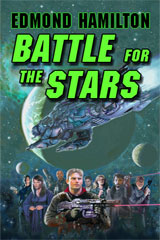
Battle for the Stars
FOLLOWED IN SPACE! The Starsong was beginning to pass between the two huge red binaries into the thicker sprawl of stars through which the channel led. The channel was not straight, and you could not take it too fast—in that swarm of suns the fabric of a ship could be torn apart in some deadly gravity drag or vaporized in collision. The only thing was that the Orionids were still following them. But Birrel said nothing. This was Garstang's job and he let him do it. The enormous pairs of red suns flashed past them on either side and were gone, and they were in the channel. Under his feet he could feel the Starsong quiver, wincing and flinching like a live thing. On either side the overhanging cliffs of stars seemed to topple toward them. He looked upward at the nebula, like a glowing thundercloud roofing the channel, and then down at the shoaling suns below. Garstang said flatly, "We didn't get away quite fast enough. They'll be barrelling in here after us and they'll have us in range before we ever get through the channel." "As far as I can see," said Birrel, "we've only got one way out of it." He looked up at the screens again, at the vast glow of the nebula overhead. Garstang was silent for a moment. Then he said, "I hoped you wouldn't think of that."

FOLLOWED IN SPACE!
The Starsong was beginning to pass between the two huge red binaries into the thicker sprawl of stars through which the channel led. The channel was not straight, and you could not take it too fast—in that swarm of suns the fabric of a ship could be torn apart in some deadly gravity drag or vaporized in collision. The only thing was that the Orionids were still following them.
But Birrel said nothing. This was Garstang's job and he let him do it. The enormous pairs of red suns flashed past them on either side and were gone, and they were in the channel. Under his feet he could feel the Starsong quiver, wincing and flinching like a live thing. On either side the overhanging cliffs of stars seemed to topple toward them. He looked upward at the nebula, like a glowing thundercloud roofing the channel, and then down at the shoaling suns below.
Garstang said flatly, "We didn't get away quite fast enough. They'll be barrelling in here after us and they'll have us in range before we ever get through the channel."
"As far as I can see," said Birrel, "we've only got one way out of it."
He looked up at the screens again, at the vast glow of the nebula overhead.
Garstang was silent for a moment. Then he said, "I hoped you wouldn't think of that."


Select the format you would like to download:
Download Unzipped Files
EPUB/Kindle/Apple iOS/Nook Format
Download Zip Files
EPUB/Kindle/Apple iOS/Nook Format Zip
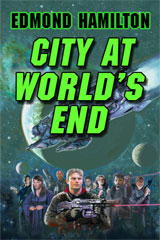
City at World's End
Then the Sky Split Open One moment Kenniston was strolling down the quiet street, lost in pleasant reverie. The next moment the sky split open! It split wide open, and above them was a bum and a blaze of light—so swift, so violent, that the air itself seemed to have burst into flame. Then there was silence—awful, suffocating silence. Kenniston felt the chill of premonition—a shapeless terror that grew into a thing too evil to be borne alone. THIS NOVEL DESCRIBES THE SHOCKING EXPERIENCE OF A GROUP OF ORDINARY PEOPLE, CATAPULTED BY A MYSTERIOUS EXPLOSION INTO THE TERRIFYINGLY STRANGE WORLD OF A MILLION YEARS HENCE. IT IS NOT A PROPHECY-BUT A WARNING!

Then the Sky Split Open
One moment Kenniston was strolling down the quiet street, lost in pleasant reverie. The next moment the sky split open!
It split wide open, and above them was a bum and a blaze of light—so swift, so violent, that the air itself seemed to have burst into flame.
Then there was silence—awful, suffocating silence.
Kenniston felt the chill of premonition—a shapeless terror that grew into a thing too evil to be borne alone.
THIS NOVEL DESCRIBES THE SHOCKING EXPERIENCE OF A GROUP OF ORDINARY PEOPLE, CATAPULTED BY A MYSTERIOUS EXPLOSION INTO THE TERRIFYINGLY STRANGE WORLD OF A MILLION YEARS HENCE. IT IS NOT A PROPHECY-BUT A WARNING!


Select the format you would like to download:
Download Unzipped Files
EPUB/Kindle/Apple iOS/Nook Format
Download Zip Files
EPUB/Kindle/Apple iOS/Nook Format Zip
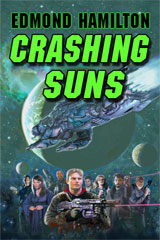
Crashing Suns
From mighty Canopus, capital of the Federated Stars, to the outer fringes of our great galaxy, the Interstellar Patrol was on the watch. Rogue suns, marauding alien intelligences, man-made comets driven by their makers for the conquest of unsuspecting worlds, diabolical conspiracies hatched in the depths of unmapped nebulas—it was the business of the Patrol's mighty spaceships to guard against such cosmic dangers. CRASHING SUNS is the epic account of this future space legion, where volunteers from a thousand worlds man the mighty starcraft of a hundred thousand years to come. It's interplanetary adventure on the classic scale, by the master hand of Edmond Hamilton.

From mighty Canopus, capital of the Federated Stars, to the outer fringes of our great galaxy, the Interstellar Patrol was on the watch. Rogue suns, marauding alien intelligences, man-made comets driven by their makers for the conquest of unsuspecting worlds, diabolical conspiracies hatched in the depths of unmapped nebulas—it was the business of the Patrol's mighty spaceships to guard against such cosmic dangers.
CRASHING SUNS is the epic account of this future space legion, where volunteers from a thousand worlds man the mighty starcraft of a hundred thousand years to come. It's interplanetary adventure on the classic scale, by the master hand of Edmond Hamilton.


Select the format you would like to download:
Download Unzipped Files
EPUB/Kindle/Apple iOS/Nook Format
Download Zip Files
EPUB/Kindle/Apple iOS/Nook Format Zip
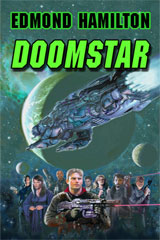
Doomstar
The sun shone brightly on this fateful morning, bringing to its planets warmth and life-giving rays. The brightness increased sharply as the morning grew older. The glare was blinding; the radiation not life-giving, but deadly. By mid-afternoon the brilliant, intense sun shone on barren space. It had blasted each of its four planets out of existence. Someone had fund a way to poison a star! And someone had to be found who could prevent the takeover—or destruction—of the entire universe. Who Johnny Kettrick, as improbable a hero there never was. Johnny Kettrick who was banned from the Cluster World for his not-too-honest dealings was sent back there with his three equally unholy partners to search out the Doomstar . . . to find the Doomstar before it burned out another world.

The sun shone brightly on this fateful morning, bringing to its planets warmth and life-giving rays. The brightness increased sharply as the morning grew older. The glare was blinding; the radiation not life-giving, but deadly. By mid-afternoon the brilliant, intense sun shone on barren space. It had blasted each of its four planets out of existence.
Someone had fund a way to poison a star!And someone had to be found who could prevent the takeover—or destruction—of the entire universe. Who Johnny Kettrick, as improbable a hero there never was. Johnny Kettrick who was banned from the Cluster World for his not-too-honest dealings was sent back there with his three equally unholy partners to search out the Doomstar . . . to find the Doomstar before it burned out another world.


Select the format you would like to download:
Download Unzipped Files
EPUB/Kindle/Apple iOS/Nook Format
Download Zip Files
EPUB/Kindle/Apple iOS/Nook Format Zip
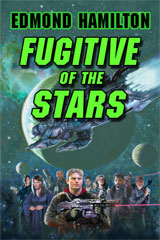
Fugitive of the Stars
WANTED: ONE OUTLAWED SPACE PILOT! Home, the spaceship's pilot, had been warned. "Don't forget the meteor swarm." And Home's directional calculations for the Vega Queen's course took that advice into account; the spaceship would go fifteen thousand miles out of its way to avoid those deadly celestial rocks. But when Home went off duty, he felt himself numbed by a curious druglike leadenness. And the next thing he knew, he was in a lifeboat, speeding away from the floating wreckage of the Vega Queen. Eighteen survivors out of one hundred and fifty-three passengers. And each one in the tiny space shell believed Home responsible . . . deliberate negligence, calculated destruction. . . . Someone had drugged Home, he knew; someone had tampered with the ship to alter its course. But who And for what cosmic purpose

WANTED: ONE OUTLAWED SPACE PILOT!
Home, the spaceship's pilot, had been warned. "Don't forget the meteor swarm." And Home's directional calculations for the Vega Queen's course took that advice into account; the spaceship would go fifteen thousand miles out of its way to avoid those deadly celestial rocks.
But when Home went off duty, he felt himself numbed by a curious druglike leadenness. And the next thing he knew, he was in a lifeboat, speeding away from the floating wreckage of the Vega Queen.
Eighteen survivors out of one hundred and fifty-three passengers. And each one in the tiny space shell believed Home responsible . . . deliberate negligence, calculated destruction. . . .
Someone had drugged Home, he knew; someone had tampered with the ship to alter its course. But who And for what cosmic purpose


Select the format you would like to download:
Download Unzipped Files
EPUB/Kindle/Apple iOS/Nook Format
Download Zip Files
EPUB/Kindle/Apple iOS/Nook Format Zip
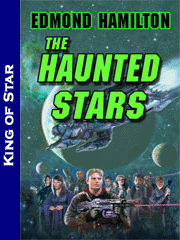
King of Stars
Hail the King of Stars! "Epic . . . lyrical . . . conceived on the grand scale," says the New York Herald Tribune. "Star-spinning allure," says The Washington Post. To which we add: "As adventurous and amazement-producing today as the day it was written." Edmond Hamilton literally created space opera—and the flat-out weird, high-baroque far future that defines the genre. (Okay, to be truthful, we'd say he created it together with E.E. "Doc" Smith.) Yet, as formative as Hamilton's novels were, there's a richness in the world-creating combined with a sometimes downright cynical voice that keeps his tales as fresh today as ever. "Edmond Hamilton's 'The Man Who Evolved' was the first science fiction short story to permanently impress me," Isaac Asimov famously remarked. What was it that put a permanent dint in the young Asimov's mind The ideas, of course! A city blasted by a doomsday bomb into the unimaginable future—where humans must fare for themselves on a burnt-out husk of a planet! An alien archaeological site on the Moon decoded—and a galactic secret revealed. A fighter pilot drawn into Norse myth for a decidedly noir take on Ragnarok! And the wonder-inducing concepts keep coming and coming! These are the great Hamilton "stand-alone" novels. This mega-volume includes: The Haunted Stars The Valley of Creation The Star of Life City at World's End Doomstar Yank at Valhalla The Sun Smasher Fugitive of the Stars Featuring art by Doug Chaffee, the entire mega-volume will be released September 15th, 2008. It will be available in the reader-friendly, unencrypted formats Webscriptions is known for. For the next 3 months, the "Best of the Rest of Hamilton" compilation will go for $20. Then the e-volume dissolves and individual ebook titles go for $4 each. No shipping fees. No dead tree crumble. Welcome, traveler. Fate has landed you in the near-unimaginable future!
Hail the King of Stars!
"Epic . . . lyrical . . . conceived on the grand scale," says the New York Herald Tribune. "Star-spinning allure," says The Washington Post. To which we add: "As adventurous and amazement-producing today as the day it was written."
Edmond Hamilton literally created space opera—and the flat-out weird, high-baroque far future that defines the genre. (Okay, to be truthful, we'd say he created it together with E.E. "Doc" Smith.) Yet, as formative as Hamilton's novels were, there's a richness in the world-creating combined with a sometimes downright cynical voice that keeps his tales as fresh today as ever.
"Edmond Hamilton's 'The Man Who Evolved' was the first science fiction short story to permanently impress me," Isaac Asimov famously remarked.
What was it that put a permanent dint in the young Asimov's mind
The ideas, of course!
A city blasted by a doomsday bomb into the unimaginable future—where humans must fare for themselves on a burnt-out husk of a planet! An alien archaeological site on the Moon decoded—and a galactic secret revealed. A fighter pilot drawn into Norse myth for a decidedly noir take on Ragnarok!
And the wonder-inducing concepts keep coming and coming!
These are the great Hamilton "stand-alone" novels. This mega-volume includes:
The Haunted Stars
The Valley of Creation
The Star of Life
City at World's End
Doomstar
Yank at Valhalla
The Sun Smasher
Fugitive of the Stars
Featuring art by Doug Chaffee, the entire mega-volume will be released September 15th, 2008. It will be available in the reader-friendly, unencrypted formats Webscriptions is known for. For the next 3 months, the "Best of the Rest of Hamilton" compilation will go for $20. Then the e-volume dissolves and individual ebook titles go for $4 each.
No shipping fees. No dead tree crumble. Welcome, traveler. Fate has landed you in the near-unimaginable future!
by Edmond Hamilton
by Edmond Hamilton
by Edmond Hamilton
by Edmond Hamilton
by Edmond Hamilton
by Edmond Hamilton
by Edmond Hamilton
by Edmond Hamilton


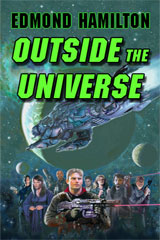
Outside the Universe
"Spaceships in thousands, and they're attacking us! They've come from somewhere toward our galaxy—have come out of intergalactic space itself to attack our universe!" The interstellar Patrol, that fabulous fleet manned by all the assorted races of our galaxy, faced its greatest struggle when that alarm came through. For this was an attack from OUTSIDE THE UNIVERSE, a vast migration from another galaxy, and it had to be stopped if a thousand worlds were to survive! This terrific classic space novel on the grandest scale involves three giant galaxies in an all-out conflict.

"Spaceships in thousands, and they're attacking us! They've come from somewhere toward our galaxy—have come out of intergalactic space itself to attack our universe!"
The interstellar Patrol, that fabulous fleet manned by all the assorted races of our galaxy, faced its greatest struggle when that alarm came through. For this was an attack from OUTSIDE THE UNIVERSE, a vast migration from another galaxy, and it had to be stopped if a thousand worlds were to survive!
This terrific classic space novel on the grandest scale involves three giant galaxies in an all-out conflict.


Select the format you would like to download:
Download Unzipped Files
EPUB/Kindle/Apple iOS/Nook Format
Download Zip Files
EPUB/Kindle/Apple iOS/Nook Format Zip
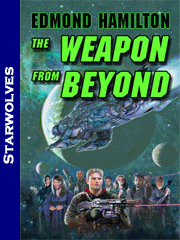
Starwolves and the Interstellar Patrol
Space Opera Apotheosis! "Edmond Hamilton's 'The Man Who Evolved' was the first science fiction short story to permanently impress me," Isaac Asimov famously remarked. And it wasn't just Asimov. Hamilton literally created space opera—and the flat-out weird, high-baroque far future that defines the genre. (Okay, to be truthful, we'd say he created it together with E.E.
Space Opera Apotheosis!
"Edmond Hamilton's 'The Man Who Evolved' was the first science fiction short story to permanently impress me," Isaac Asimov famously remarked.
And it wasn't just Asimov. Hamilton literally created space opera—and the flat-out weird, high-baroque far future that defines the genre. (Okay, to be truthful, we'd say he created it together with E.E.
by Edmond Hamilton
by Edmond Hamilton
by Edmond Hamilton
by Edmond Hamilton
by Edmond Hamilton
by Edmond Hamilton


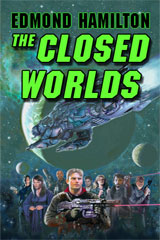
The Closed Worlds
When Morgan Chane and his comrades of John Dilullo's interstellar mercenaries invaded the Close World of Arkuu in search of a lost Terran expedition, they found a planet of strange menace. Incredibly powerful monsters prowled though Arkuu's dense jungles, and the ghosts of the planet's past haunted its ancient deserted cities. The Arkuuns themselves fought grimly to drive the Terrans away. But at last Chane discovered the Free-Faring, the terrible alien secret of Arkuu . . . and suddenly he knew why no Terran had left the Closed Worlds alive.

When Morgan Chane and his comrades of John Dilullo's interstellar mercenaries invaded the Close World of Arkuu in search of a lost Terran expedition, they found a planet of strange menace. Incredibly powerful monsters prowled though Arkuu's dense jungles, and the ghosts of the planet's past haunted its ancient deserted cities. The Arkuuns themselves fought grimly to drive the Terrans away. But at last Chane discovered the Free-Faring, the terrible alien secret of Arkuu . . . and suddenly he knew why no Terran had left the Closed Worlds alive.


Select the format you would like to download:
Download Unzipped Files
EPUB/Kindle/Apple iOS/Nook Format
Download Zip Files
EPUB/Kindle/Apple iOS/Nook Format Zip
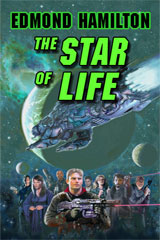
The Star of Life
Kirk Hammond was a man alone. He had been chosen to ride in the first manned satellite to go out around the Moon and back to Earth. But when the satellite failed to orbit properly, it went on past the Moon into the vastness of outer space, and a whole world watched helplessly as he was borne toward an unthinkably lonely death. Yet destiny decreed that Kirk Hammond should suffer, not death but a pseudo-death. And he awoke from it to find that a hundred centuries had passed and that the space age which had begun in the 20th Century had now grown into a vast galactic civilization that had carried the sons of Earth to countless stars and worlds. But, unexpectedly, the conquest of space had changed Man himself, and the human race had become not one but several species. Hammond was plunged into the climactic struggle between the new races. And in his quest with a desperate band for the mysterious Star of Life that was the key to the struggle, in his relations with the strange and beautiful Thayn Marden who was not a human woman, in his odyssey through the mighty suns and earthly worlds of the galaxy, a man of the 20th Century found himself facing the dangers of the great space age which he himself helped pioneer.

Kirk Hammond was a man alone.
He had been chosen to ride in the first manned satellite to go out around the Moon and back to Earth. But when the satellite failed to orbit properly, it went on past the Moon into the vastness of outer space, and a whole world watched helplessly as he was borne toward an unthinkably lonely death.
Yet destiny decreed that Kirk Hammond should suffer, not death but a pseudo-death. And he awoke from it to find that a hundred centuries had passed and that the space age which had begun in the 20th Century had now grown into a vast galactic civilization that had carried the sons of Earth to countless stars and worlds. But, unexpectedly, the conquest of space had changed Man himself, and the human race had become not one but several species.
Hammond was plunged into the climactic struggle between the new races. And in his quest with a desperate band for the mysterious Star of Life that was the key to the struggle, in his relations with the strange and beautiful Thayn Marden who was not a human woman, in his odyssey through the mighty suns and earthly worlds of the galaxy, a man of the 20th Century found himself facing the dangers of the great space age which he himself helped pioneer.


Select the format you would like to download:
Download Unzipped Files
EPUB/Kindle/Apple iOS/Nook Format
Download Zip Files
EPUB/Kindle/Apple iOS/Nook Format Zip
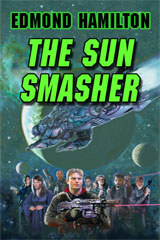
The Sun Smasher
A CROWN FOR THE STAR-CROSSED "It can't be true! It must be some kind of hoax!" These were the words that went spinning through Neil Banning's mind when the Greenville authorities told him that the house he had grown up in, the aunt and uncle who had raised him, had never existed. So Banning found himself in jail, charged with disturbing the peace—and maybe insanity. But when a stranger from outer space came to his cell at midnight and hailed him as the Valkar of Katuun, then Banning decided that maybe the authorities were right, maybe he was crazy. Because the only alternative was to believe the impossible explanation of the Outworlder—that he really was the exiled ruler of a remote star-world, and the personality of Neil Banning was an elaborate fraud. It didn't really matter, though, who was right. Banning was on his way to Katuun whether he liked it or not. And as Banning—or the Valkar—he would have to save that star-world from the terror of THE SUN SMASHER . . . or perish with the loyal subjects he might never even have known!

A CROWN FOR THE STAR-CROSSED
"It can't be true! It must be some kind of hoax!" These were the words that went spinning through Neil Banning's mind when the Greenville authorities told him that the house he had grown up in, the aunt and uncle who had raised him, had never existed.
So Banning found himself in jail, charged with disturbing the peace—and maybe insanity. But when a stranger from outer space came to his cell at midnight and hailed him as the Valkar of Katuun, then Banning decided that maybe the authorities were right, maybe he was crazy. Because the only alternative was to believe the impossible explanation of the Outworlder—that he really was the exiled ruler of a remote star-world, and the personality of Neil Banning was an elaborate fraud.
It didn't really matter, though, who was right. Banning was on his way to Katuun whether he liked it or not. And as Banning—or the Valkar—he would have to save that star-world from the terror of THE SUN SMASHER . . . or perish with the loyal subjects he might never even have known!


Select the format you would like to download:
Download Unzipped Files
EPUB/Kindle/Apple iOS/Nook Format
Download Zip Files
EPUB/Kindle/Apple iOS/Nook Format Zip
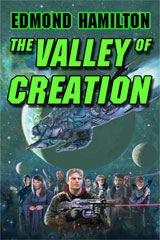
The Valley of Creation
BEASTS, MEN . . . OR ALIENS In that hidden valley, land of strangely forbidding beauty, Eric Nelson, soldier of fortune, faced a battle weirder and more savage than any he had ever fought. He was hired to fight for humanity, against beings that seemed to be both more and less than human. The weapons of the enemy included centuries-old powers of magic and superstition.. :but Nelson fought grimly, even when his mind was helplessly trapped in the body of a wolf. Then came the climactic test of his allegiance, the knowledge that more than just humanity was at stake... and the final mind-shattering discovery of the alien secret that lay buried in the Cavern of Creation! Here is a masterpiece of sword-and-sorcery that belongs on your shelves next to those of Burroughs, Eddison, and R. E. Howard.

BEASTS, MEN . . . OR ALIENS
In that hidden valley, land of strangely forbidding beauty, Eric Nelson, soldier of fortune, faced a battle weirder and more savage than any he had ever fought.
He was hired to fight for humanity, against beings that seemed to be both more and less than human.
The weapons of the enemy included centuries-old powers of magic and superstition.. :but Nelson fought grimly, even when his mind was helplessly trapped in the body of a wolf.
Then came the climactic test of his allegiance, the knowledge that more than just humanity was at stake... and the final mind-shattering discovery of the alien secret that lay buried in the Cavern of Creation!
Here is a masterpiece of sword-and-sorcery that belongs on your shelves next to those of Burroughs, Eddison, and R. E. Howard.


Select the format you would like to download:
Download Unzipped Files
EPUB/Kindle/Apple iOS/Nook Format
Download Zip Files
EPUB/Kindle/Apple iOS/Nook Format Zip
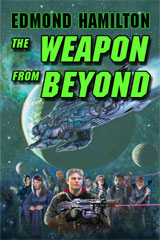
The Weapon From Beyond
Morgan Chane was an Earthman by parentage, but he had been born on the pirate-world Varna, whose heavy gravity had developed strength and incredibly quick reflexes in him. When he was old enough, he joined the raider-ships that looted the starworlds, and fought side by side with the dreaded Starwolves of Varna. But then there was a fight among them. Chane killed their leader, and the other Starwolves turned on him. He barely got away alive—wounded near death, his Starwolf pursuers following him across the galaxy. And there was nowhere he could seek refuge, for no world would lift a hand to save one of the hated Starwolves.

Morgan Chane was an Earthman by parentage, but he had been born on the pirate-world Varna, whose heavy gravity had developed strength and incredibly quick reflexes in him. When he was old enough, he joined the raider-ships that looted the starworlds, and fought side by side with the dreaded Starwolves of Varna. But then there was a fight among them. Chane killed their leader, and the other Starwolves turned on him. He barely got away alive—wounded near death, his Starwolf pursuers following him across the galaxy. And there was nowhere he could seek refuge, for no world would lift a hand to save one of the hated Starwolves.


Select the format you would like to download:
Download Unzipped Files
EPUB/Kindle/Apple iOS/Nook Format
Download Zip Files
EPUB/Kindle/Apple iOS/Nook Format Zip
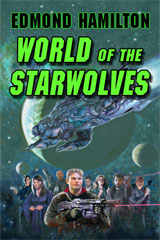
World of the Starwolves
Morgan Chane was an Earthman by parentage, but he had been born on the pirate-world Varna, whose heavy gravity had developed strength and incredibly quick reflexes in him. When he was old enough, he joined the raider-ships that looted the starworlds, and fought side by side with the dreaded Starwolves of Varna. But then there was a fight among them. Chane killed their leader, and the other Starwolves turned on him. He barely got away alive—wounded near death, his Starwolf pursuers following him across the galaxy. And there was nowhere he could seek refuge, for no world would lift a hand to save one of the hated Starwolves.

Morgan Chane was an Earthman by parentage, but he had been born on the pirate-world Varna, whose heavy gravity had developed strength and incredibly quick reflexes in him. When he was old enough, he joined the raider-ships that looted the starworlds, and fought side by side with the dreaded Starwolves of Varna. But then there was a fight among them. Chane killed their leader, and the other Starwolves turned on him. He barely got away alive—wounded near death, his Starwolf pursuers following him across the galaxy. And there was nowhere he could seek refuge, for no world would lift a hand to save one of the hated Starwolves.


Select the format you would like to download:
Download Unzipped Files
EPUB/Kindle/Apple iOS/Nook Format
Download Zip Files
EPUB/Kindle/Apple iOS/Nook Format Zip




